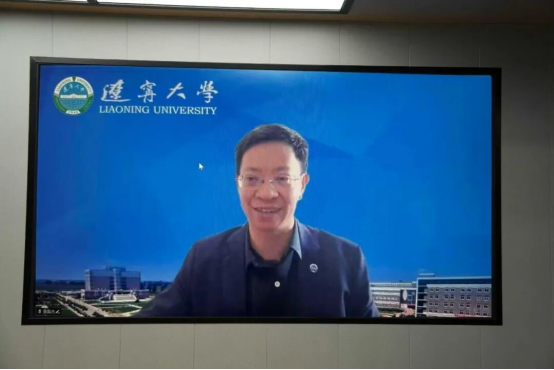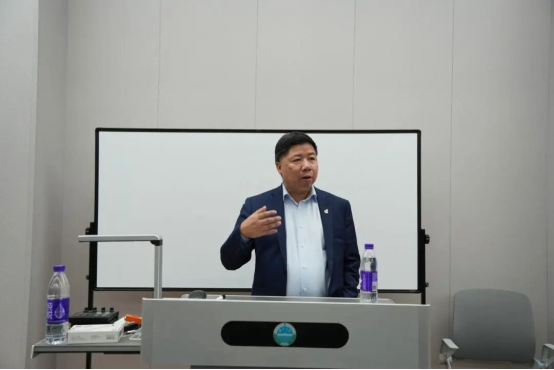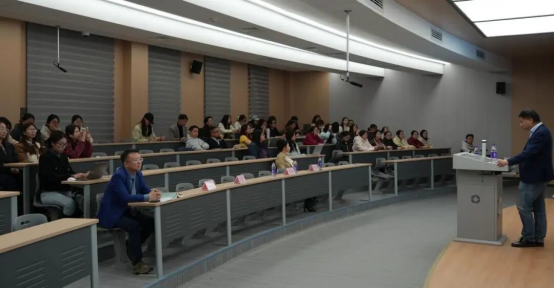On October 25, the sixth session of the “Bai Qinxian Overseas Distinguished Scholars Forum” was held at the Discipline Inspection and Supervision Building on Puhe Campus, Liaoning University (LNU). Professor Tony Fang, Stephen Jarislowsky Chair Professor at Memorial University of Newfoundland, was invited to deliver an academic report titled “AI and Labor Market Outcomes: Evidence from China”. President Yu Miaojie, President of Liaoning University delivered an online opening address.

On behalf of LNU, Yu Miaojie extended a warm welcome to Professor Fang and briefed the faculty and students on Professor Fang’s outstanding achievements in the fields of international migration and multiculturalism, public policy, and human resource policy. Professor Fang is a Fellow of the Royal Society of Arts, former President of the Chinese Economists Society, a member of the World Bank’s Expert Advisory Committee on “Migration and Development”, an expert panelist for Canada’s “Federal Government Pension Plan”, and a member of the review committee for Canada’s “Employment Equity Act”.

In his lecture, “AI and Labor Market Outcomes: Evidence from China”, Professor Fang first reviewed key national strategic milestones in China’s AI industry: the State Council’s release of the “New Generation Artificial Intelligence Development Plan” in 2017, and the inclusion of “AI+” as a key economic focus for 2025 in the Central Economic Work Conference at the end of 2024. He highlighted that, against the backdrop of simultaneous breakthroughs in data, computing power, and algorithms, AI is reshaping the structure of labor demand in China. By integrating nearly 16,000 AI job postings from nine major recruitment platforms (2016–2024) with over 900 million all-industry job postings and matching them with individual tracking data from the China Family Panel Studies (CFPS), Professor Fang’s team discovered that AI industrial policy shocks led to two “leap-forward” expansions in AI job postings in 2017–2018 and 2023–2024. Key findings include: the number of posting enterprises doubled; the AI salary premium continued to widen, far exceeding the national average; approximately 80% of positions required a bachelor’s degree or higher, with demand for master’s degrees rising annually; and job demand is expanding from core algorithm roles to frontier applications such as data products, AI Ops, large language models, and autonomous driving, with geographical diffusion from Beijing, Shanghai, and Shenzhen to nationwide.
Subsequently, Professor Fang detailed the core research design: using city/county-level “AI job density” as the key independent variable, matched with microdata from the CFPS (2010–2022), and constructing a two-way fixed effects model incorporating individual human capital, urban industrial structure, and policy time trends to assess the causal impact of AI labor demand on wages, employment, and income inequality. Benchmark model results showed: a one standard deviation increase in local AI job density led to a significant approximate 1.9% rise in individual annual wages. This effect was particularly pronounced for females (up to 4.6%), while it was not significant for males, indicating that AI expansion significantly narrowed the gender wage gap. Regionally, the Beijing-Tianjin-Hebei, Yangtze River Delta, and Pearl River Delta metropolitan areas benefited the most, with a wage elasticity of 7.9%, compared to only 2.1% for non-metropolitan cities. By occupation, routine roles such as sales, catering, and manufacturing showed no significant gains, whereas positive returns for females were especially notable in healthcare and financial professional services. Additionally, AI penetration did not yet show significant benefits for agricultural hukou holders or low-education groups, reflecting the presence of Skill-Biased Technological Change (SBTC) in China as well.

Faculty and students actively participated in the discussion, creating a lively atmosphere with frequent interactions. During the Q&A session, attendees exchanged views on topics including the substitution risks AI diffusion poses for low-skilled workers, the sustainability of the female wage premium, specific methods for variable selection and endogeneity treatment in the model, barriers to AI adoption in SMEs and potential policy entry points, and institutional factors behind regional disparities.
Following the lecture, LNU presented Professor Fang with a commemorative certificate for the “Bai Qinxian Overseas Distinguished Scholars Forum” and a photo of the event. This report was organized by the Division of Economics, hosted by the School of International Economics and International Relations, and co-organized by the Digital Economy Modern Industry Research Institute. Over 80 faculty members and students from LNU attended the event.
Speaker Profile
Tony Fang is a Fellow of the Royal Society of Arts, the Stephen Jarislowsky Chair Professor at Memorial University, an Adjunct Professor at the University of Toronto and Toronto Metropolitan University, a member of the World Bank’s Expert Advisory Committee on “Migration and Development”, an expert panelist for Canada’s “Federal Government Pension Plan”, a member of the review committee for Canada’s “Employment Equity Act”, and Director of the Labor Market Integration Unit at the Metropolitan Centre in Ontario, Canada. Invited by the Canadian federal government, he has served as an expert panelist providing advisory input on pension system reform and the comprehensive review and revision of “Canada’s Employment Equity Act”.